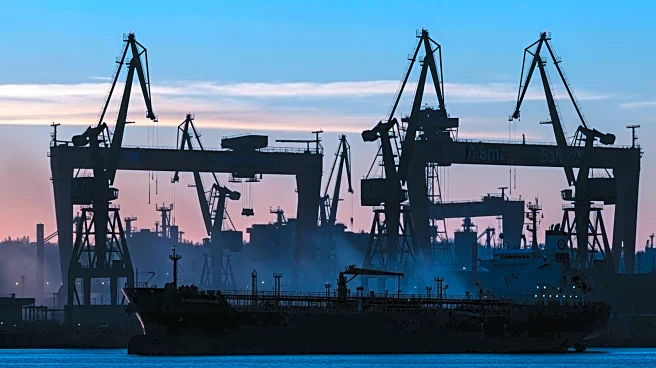What's Happening?
Indonesian authorities are investigating a second fatal fire aboard the tanker Federal II, which was undergoing repairs at the ASL Shipyard in Batam. The fire, which occurred on October 15, resulted in the deaths
of 10 shipyard workers, primarily due to smoke inhalation. Additionally, 21 workers were injured, with some reported to be heavily injured. The fire started early in the morning, and firefighters managed to extinguish it within an hour. This incident follows a previous fire in June at the same shipyard, which killed four workers and injured nine others. The tanker, built in Japan in 1990, was being converted to a Floating Storage and Offloading (FSO) unit after completing a charter with China's CNOOC.
Why It's Important?
The recurrence of fatal fires at the ASL Shipyard raises significant concerns about safety protocols and practices within the ship repair industry in Indonesia. The incidents highlight potential lapses in safety measures, which could have broader implications for worker safety and regulatory oversight in industrial settings. The shipyard's ability to ensure safe working conditions is under scrutiny, which may lead to increased regulatory actions or reforms. The impact on the shipyard's reputation and operations could be substantial, affecting its business relationships and future contracts.
What's Next?
Authorities are currently collecting evidence and interviewing witnesses to determine the cause of the latest fire. The investigation may lead to legal actions or penalties against those responsible for safety violations. There could be increased pressure on the shipyard to implement stricter safety measures and training programs to prevent future incidents. The findings from the investigation may also influence industry-wide safety standards and practices, potentially leading to regulatory changes.
Beyond the Headlines
The repeated safety failures at the shipyard may prompt broader discussions about labor rights and safety standards in Indonesia's industrial sectors. There could be calls for more robust enforcement of safety regulations and better protection for workers. The incidents may also affect international perceptions of Indonesia's industrial safety standards, impacting foreign investment and partnerships.









